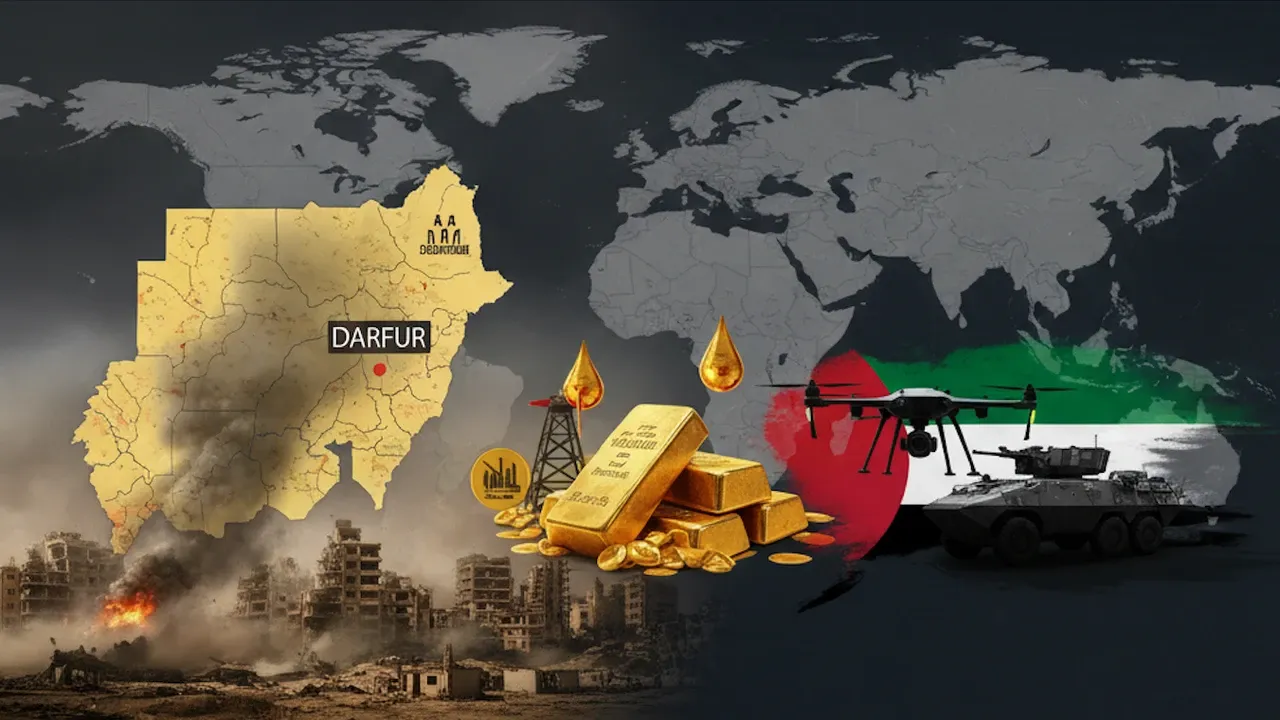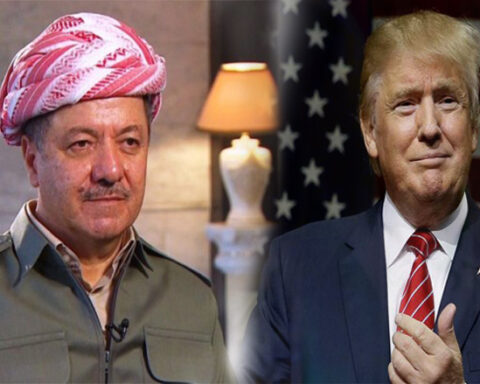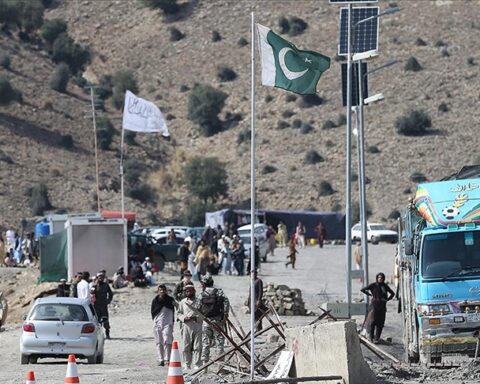RSF Redraws Sudan War Map
When the guns fell silent in El Fasher in late October 2025, the sound that followed wasn’t victory but the hollow hush of exhaustion. After eighteen months under siege, the capital of North Darfur, the last major city still under army control, finally crumbled. Streets that once echoed with the shuffle of displaced families now whispered with ash. Hospitals had turned into morgues, and the horizon breathed smoke. Yet beneath the ruin, something else had taken shape: the skeleton of a new order stretching from Darfur’s scorched valleys to the mirrored skylines of the Gulf.
The fall of El Fasher was more than another battle lost. It marked the moment a war began to redraw Sudan’s map and, in many ways, its meaning. The Rapid Support Forces (RSF), born from the ashes of the Janjaweed, evolved from local enforcers into a transnational enterprise. What started in 2023 as a feud between two generals, Mohamed Hamdan Dagalo, known as Hemedti, and Abdel Fattah al-Burhan, became a careful dismantling of a state built on patronage, violence, and gold.
The War That Consumed Its Makers
The RSF’s story began, tellingly, as an act of control. In 2013, President Omar al-Bashir assembled a force to pacify Darfur, recruiting men from tribal militias already infamous for atrocities. He paid them, denied them real power, and assumed loyalty would follow. It did not. What he created instead was a private army with its own appetites.
Then came gold. When Jebel Amer’s veins glittered into view, the region’s fate shifted. Hemedti, a former camel trader with a sharp instinct for markets and moods, seized the mines. Whether by luck or calculation, that move lifted him from provincial warlord to national player. By 2018, RSF-linked companies dominated Sudan’s informal gold trade, and researchers estimated that more than two-thirds of production bypassed the central bank. It was smuggled through intricate networks that ended in Dubai’s refineries. The metal left Darfur in sacks and arrived in the Gulf polished, packaged, and cleansed of its past.
What followed was a quiet bargain. Sudanese warlords provided bullion, Gulf brokers provided dollars, fuel, and discreet access. Each side got what it wanted, and few asked questions. The RSF grew wealthy, autonomous, and almost untouchable. When Bashir finally fell in 2019, the balance of power had already tipped.
On the transitional council, Hemedti did not sit as a subordinate. He sat as a shareholder. He spoke of reform even as his men patrolled streets that still remembered blood. His wealth gave him leverage, the mines gave him independence, and his patronage networks made him durable. To many Sudanese, he appeared both partner and predator.
By early 2023, the so-called “integration” talks that were meant to fold the RSF into the regular army sounded less like negotiation and more like a countdown. For Hemedti, integration meant surrendering power. For Burhan, it was the last chance to salvage a unified command. The war that followed was not born of misunderstanding; it was the arithmetic of ambition. Only one army could remain, and both men meant it to be theirs.
A War Financed by Gold
From the first days of fighting, it was clear the RSF hadn’t come unprepared. Their convoys moved with modern vehicles, encrypted radios, and supply lines that seemed to ignore geography. While the army in Port Sudan counted dwindling reserves, Hemedti’s forces drew from a different treasury. Their war ran on gold.
Control of mines in Darfur and Kordofan, and the quiet taxation of Sahel trade, gave the RSF a flow of hard currency the state could never match. Inside Sudan, officers doubled as entrepreneurs, running mining zones, levying fees, managing fleets. Bullion shipments slipped west through Chad and the Central African Republic or south into South Sudan, then resurfaced in the Gulf’s refineries. By the time the metal reached Dubai, its origin story had been filed down.
Officials in the United Arab Emirates insist their gold trade is transparent. Perhaps. But the provenance of shipments from conflict zones often goes politely unexamined. Planes that ferry aid into Port Sudan have been seen leaving remote airstrips with unlisted cargo. The calculus for Abu Dhabi appears pragmatic: access to cheap bullion, future stakes in land and logistics, a foothold along the Red Sea. For the RSF, those same routes mean liquidity and a kind of legitimacy, not a state, but close enough to behave like one.
What’s emerged is sovereignty without institutions. The RSF governs territory, taxes commerce, and bankrolls its army through international trade. Fighters are paid in dollars, officers travel freely, and their leader styles himself as a businessman-general promising order where the state failed. Under the gloss lies something brittle: a warlord economy in which guns guard the mines and the mines pay for more guns. An empire of dust and bullion, buying tomorrow with the proceeds of today.
El Fasher: The Siege That Redrew the Map
For 18 months, El Fasher held its breath. A city that once sheltered families displaced by earlier wars became the last flickering bastion of resistance in Darfur. By the summer of 2024, its defenders, soldiers, volunteers, and local militias, were surviving on grit and memory. Flour vanished, electricity failed, surgeons operated by candlelight. A doctor told a visiting reporter, “We measure time by the buzzing overhead,” meaning drones.
When El Fasher finally fell in October 2025, the collapse was both physical and symbolic. All five Darfur capitals came under RSF control, and the army retreated east toward Port Sudan. Western Sudan stopped looking like a province and started behaving like a parallel country.
The devastation was staggering. Satellite imagery showed entire neighborhoods flattened, particularly Masalit areas, echoing Darfur’s earlier horrors. Yet the capture of El Fasher wasn’t only military, it was mercantile. The city sits where roads from Jebel Amer’s goldfields meet routes to Chad and the Central African Republic. When RSF convoys rolled through the gates, they didn’t just claim ground; they seized arteries. Fuel, food, and bullion began to move under their escort. Logistics became leverage, and leverage became rule.
That’s why this fall matters so much. It marked the moment the RSF stopped acting like an insurgency and started operating like a government. Territory, revenue, recognition—the grim trinity of modern legitimacy—shifted decisively west. The siege’s end doesn’t hint at peace; it hints at permanence. Western Sudan now looks like a militia-run statelet, financed by gold, guarded by guns, and quietly sustained by those who still trade with it.
Empire of Dust: The Future of Sudan’s War
Sudan today resembles two overlapping countries sharing one exhausted body. In the west, the RSF reigns through gold and Gulf money. In the east, the army clings to customs fees, foreign aid, and patriotic rhetoric. Both live by taxing trade, courting patrons, and shifting the cost onto civilians. What unites them, grimly, is hunger.
This is no longer a clash of ideology; it is a struggle over economic sovereignty. Gold convoys snake out of Darfur to fund the weapons guarding the mines. Port blockades inflate prices, making smuggling pay better than peace. The Sudan civil war feeds on itself, a serpent biting its tail, digesting chaos for calories.
Hemedti now pitches himself as a modernizer, promising investment and jobs while his men police villages still blackened by fire. Burhan wraps himself in the flag, vowing to defend unity even as his officers skim from the same smuggling networks. Two uniforms, same logic.
Neighbors have adapted. The UAE maintains discreet ties to the trade, Egypt lends the army quiet assistance to protect Nile interests, and Russian contractors guard mining sites in exchange for concessions. Ideology feels secondary to opportunity. As one Nairobi diplomat shrugged, “Stability is noble, but instability sometimes pays.”
Meanwhile, the humanitarian crisis keeps deepening. Over ten million Sudanese have been displaced, with camps in Chad and South Sudan overflowing. Aid convoys are taxed or blocked by the very men they seek to bypass. Every sack of flour becomes a bargaining chip, every vaccine a toll. At times, it feels as if the war has monetized mercy itself.
Beyond Sudan, the world watches with polite paralysis. Western governments issue statements of concern, sanction a handful of RSF figures, then sidestep the bullion routes that matter most. Conflict gold still gleams through Dubai’s markets, and debates in Geneva circle the same drain: Moscow vetoes, Beijing abstains, Washington urges. In the corridors of the United Nations, one envoy was overheard calling Sudan “tragic, complicated, expendable.” Cruel words, yet on bad days, uncomfortably plausible.
Here’s the bitter irony. The same gold funding atrocities ends up decorating wrists and wedding bands from London to Los Angeles. The distance between El Fasher’s ash and a boutique counter has never felt shorter.
So, no, El Fasher doesn’t end the war. It hardens it. The system works too well for those who profit from it. Unless the gold loses its glitter, the guns won’t lose their voice. The empire of dust endures, grain by grain, while the world keeps looking past the smoke.






